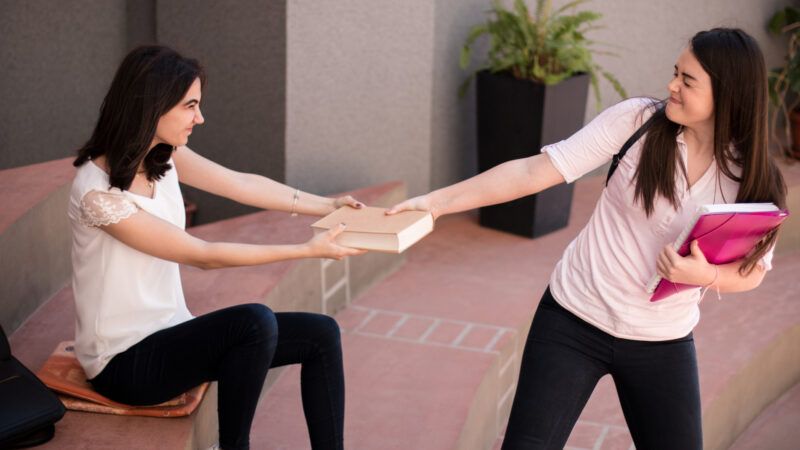School Choice Is the Answer to Education Disputes
Religious families aren’t the only ones seeking escape from endless curriculum wars.

As Americans fight a very modern battle over ideological spin in public schools, the Supreme Court has agreed to hear a case rooted in earlier struggles over lesson content. The justices will decide whether Maine can continue to exclude religious schools from a program that pays private school tuition for students that live in places that don't have public high schools. Given the court's recent recognition that such restrictions are historically rooted in anti-Catholic bigotry and unacceptable under the First Amendment, the likely outcome is greater freedom for families to choose education that embodies their values.
In Maine, families living in towns that don't fund their own high schools can enroll their kids in the public or private schools of their choice with the tuition paid by the home town. One limitation, though, is that the chosen school must be nonreligious for the cost to be reimbursed. Such restrictions (often called "Blaine amendments") exist in many states and only narrowly failed to take hold in the federal Constitution in 1875. While seemingly intended to reinforce the separation of church and state, they have their roots in a time when public officials sought to prevent the funding of alternatives to Protestant-dominated institutions.
"An effort by Roman Catholics to obtain a share of state educational spending for the network of parochial schools they were developing, in reaction to the overt Protestantism of public schools, served as the impetus for these measures," Jane G. Rainey, a professor emeritus of political science at Eastern Kentucky University, noted in 2009 for the Free Speech Center's First Amendment Encyclopedia. Interestingly, the 19th-century restrictions were named after Rep. James G. Blaine of Maine, though his own state's restriction is of more recent vintage.
Blaine amendments survived most challenges until 2020, when the U.S. Supreme Court ruled on arguments against Montana's restrictions on religious schools benefiting from a tax credit-funded scholarship program in Espinoza v. Montana Department of Revenue. For the majority, Chief Justice John Roberts acknowledged the bigotry behind limits on the participation of religious schools in education choice programs. The court found such restrictions to be a violation of the Free Exercise Clause of the First Amendment.
"A State need not subsidize private education," wrote Roberts. "But once a State decides to do so, it cannot disqualify some private schools solely because they are religious."
The Institute for Justice, which argued for the plaintiffs in Espinoza, also represents the parents in the Maine case, Carson v. Makin.
"By singling out religion—and only religion—for exclusion from its tuition assistance program, Maine violates the U.S. Constitution," says Senior Attorney Michael Bindas of the Institute for Justice. "The state flatly bans parents from choosing schools that offer religious instruction. That is unconstitutional."
While Carson would seem to be an opportunity to conclude an almost forgotten struggle between religious sects over control of schooling, the question of who decides what students are taught remains relevant in the modern world. In his concurrence in Espinoza, Associate Justice Samuel Alito explicitly connected ongoing curriculum battles to the disagreements of the past.
"Catholic and Jewish schools sprang up because the common schools were not neutral on matters of religion," observed Alito. "Today's public schools are quite different from those envisioned by Horace Mann, but many parents of many different faiths still believe that their local schools inculcate a worldview that is antithetical to what they teach at home… The tax-credit program adopted by the Montana Legislature but overturned by the Montana Supreme Court provided necessary aid for parents who pay taxes to support the public schools but who disagree with the teaching there," he added.
Arguments may have moved on from theology to ideology, but differences over what should be taught in the classroom are eternal. The inevitability of such disagreements is embodied, at the moment, in current arguments over whether schools paid for by everybody should teach lessons rooted in controversial Critical Theory interpretations of history and race relations. The National Education Association, for its part, endorses the adoption of that viewpoint by public schools.
But that's hardly the full history of such debates. Before Critical Race Theory and antiracism captured the headlines, parents and educators fought over whether to refer to the United States as a "republic" or a "democracy." State-level public educators in California and Texas purchased textbooks that put clashing political spin on economics, slavery, and civil liberties.
"The books have the same publisher," Dana Goldstein wrote for The New York Times in January 2020. "They credit the same authors. But they are customized for students in different states, and their contents sometimes diverge in ways that reflect the nation's deepest partisan divides."
Everybody with a strong point of view, it seems, either wants to influence what students are taught, or else escape the clutches of people with whom they disagree who exercise such control.
By resurrecting a century-and-a-half-old argument over whether families can choose for education funding to follow their children to religious schools that share their values, Carson reasserts the importance of choice in settling disagreements over what is taught in the classroom. Religious belief just happens to be one continuing source of friction in a world in which people clash over viewpoints that may be religious or secular but are undoubtedly closely held and are often the source of vigorous conflicts.
With its eventual decision in a case brought by parents from Maine, the U.S. Supreme Court might finally settle, one way or another, a long-simmering debate over allowing education funding to follow students who find public schools hostile to their faith and prefer more religious content in their lessons. But it will also emphasize the important role that choice plays in empowering families to escape curriculum wars by leaving such battles behind in favor of peacefully selecting their children's learning environments.
Show Comments (86)